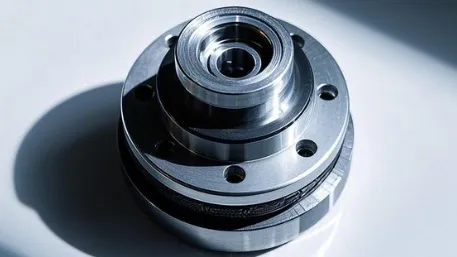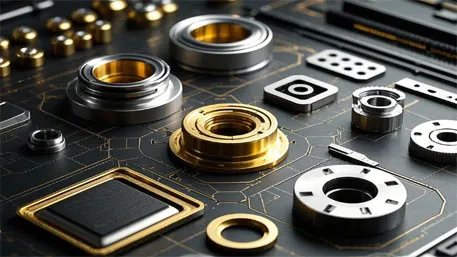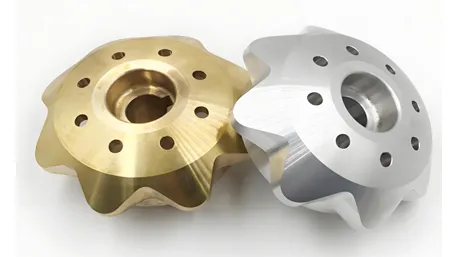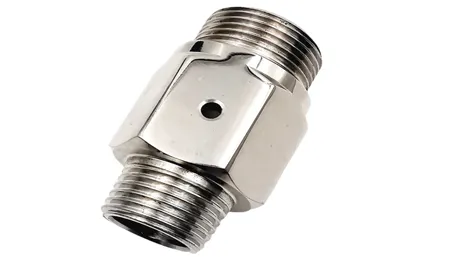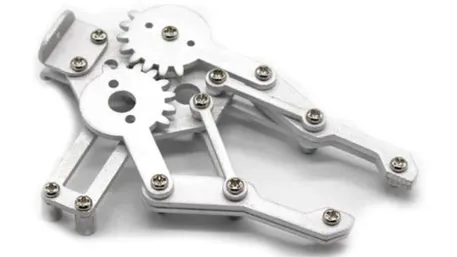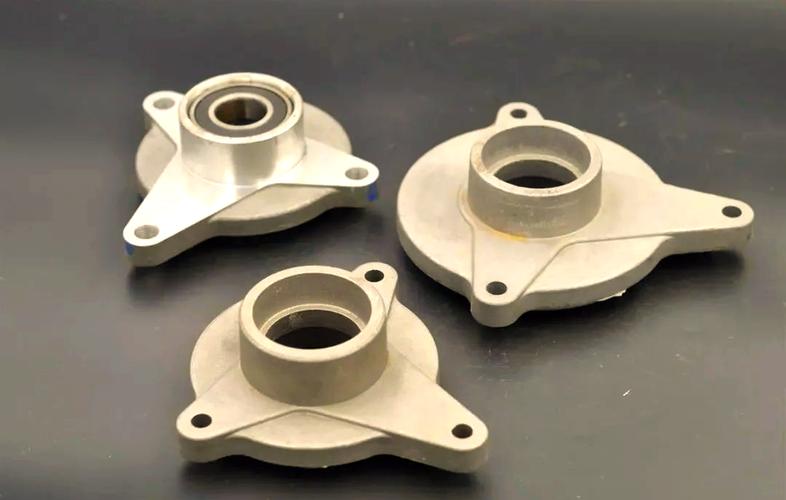In the intricate world of mechanical power transmission, custom CNC gear shaft parts are the unsung heroes that ensure seamless operation and reliable performance across diverse industries. By combining the precision of Computer Numerical Control (CNC) machining with the specialized requirements of gear and shaft design, these parts offer tailored solutions for applications where accuracy, durability, and efficiency are paramount. This article delves into the technical capabilities, customization process, material selection, quality control, and industry applications of custom CNC gear shaft parts, highlighting their significance in modern machinery.
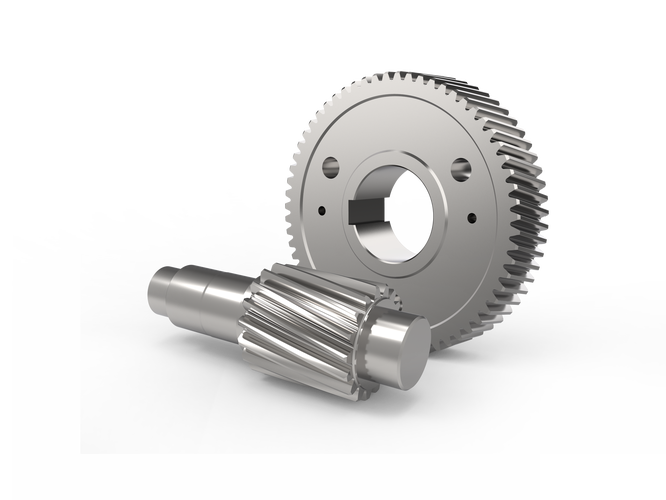
I. Technical Capabilities: Unparalleled Precision in Gear and Shaft Manufacturing
(A) Ultra – High Dimensional Accuracy
CNC machining systems are meticulously calibrated to achieve exceptional dimensional accuracy in the production of gear shaft parts. With positioning accuracy reaching ±0.002mm and repeat positioning accuracy of ±0.003mm, we can fabricate gear shafts with extremely tight tolerances. For instance, when manufacturing gear shafts for high – precision industrial gearboxes, the diameters of the shaft sections, the pitch diameters of the gears, and the keyway dimensions can be maintained within these precise limits. This level of accuracy ensures a perfect fit between the gears, shafts, and other components, minimizing backlash and enhancing the overall efficiency of power transmission.
(B) Complex Geometry Machining
Five – axis CNC machining technology enables the creation of gear shaft parts with highly complex geometries. Whether it’s shafts with multiple gear teeth profiles, helical gears with specific lead angles, or shafts with integrated splines and keyways, the five – axis system can execute these designs with precision. Compared to traditional machining methods, five – axis CNC machining reduces setup – related errors from ±0.01mm to within ±0.003mm. Moreover, it boosts production efficiency by over 60%, allowing for the rapid manufacturing of custom gear shaft parts even with the most intricate designs, meeting the urgent demands of modern manufacturing.
(C) Advanced Gear Hobbing and Grinding Techniques
For gear shaft parts, specialized machining techniques such as gear hobbing and grinding are crucial. CNC – controlled gear hobbing machines use precision – made hobs to cut gear teeth with high accuracy, ensuring correct tooth profiles, pitches, and helix angles. The hobbing process can be optimized through CNC control to achieve the best surface finish and dimensional accuracy. In the case of gears that require high – precision surface finishes and tight tolerances, CNC – guided gear grinding machines are employed. These machines can grind the gear teeth to achieve a smooth surface, reducing friction and noise during operation, and enhancing the overall lifespan of the gear shaft parts.
II. End – to – End Customization: Tailored to Your Exact Requirements
(A) In – Depth Requirement Analysis and Design Conceptualization
When you approach us with your gear shaft part requirements, our experienced engineering team engages in detailed discussions to understand your application, performance expectations, and design preferences. We consider factors such as the type of machinery the gear shaft will be used in (e.g., automotive transmissions, industrial gearboxes, robotics), the power transmission requirements (torque, speed, direction), the operating environment (temperature, humidity, corrosive conditions), and any specific functional or aesthetic requirements. Using state – of – the – art CAD/CAM software, we generate multiple design concepts. We then collaborate closely with you, refining the designs until they perfectly align with your vision, whether it’s a minor modification to a standard gear shaft or a completely new design for a specialized project.
(B) Strategic Material Selection and Cost Analysis
Based on the finalized design, we recommend the most suitable materials for your custom gear shaft parts. Different materials offer varying combinations of strength, durability, wear resistance, and cost. For example, alloy steels like 4140 and 4340 are commonly used for gear shafts due to their high strength, good hardenability, and excellent wear resistance. They can withstand high torque and bending loads, making them ideal for heavy – duty applications. For applications where corrosion resistance is also important, stainless steels such as 304 and 316 can be considered, although they may have slightly lower strength compared to alloy steels. Simultaneously, we conduct a detailed cost analysis, factoring in material costs, machining complexity (especially for complex gear and shaft geometries), and production volume, to provide you with a transparent and competitive quote.
(C) Precision Manufacturing and Order Tracking
Once you approve the design and quote, production commences. You can monitor the progress of your order in real – time through our dedicated online tracking platform. Our skilled technicians adhere to strict manufacturing standards, using advanced CNC turning, milling, hobbing, and grinding machines to produce gear shaft parts that meet the highest quality benchmarks. We keep you informed at every stage of the production process, from raw material procurement to the final inspection, ensuring complete transparency and peace of mind throughout the manufacturing journey.
(D) Rigorous Quality Assurance and Timely Delivery
After production, each custom gear shaft part undergoes a rigorous quality inspection. Only parts that meet our exacting standards are shipped to you. We perform dimensional inspections using coordinate measuring machines (CMMs) to ensure that all critical dimensions are within ±0.002mm. Gear tooth profiles are carefully inspected using gear measuring instruments to verify the accuracy of the tooth form, pitch, and helix angle. Surface finish measurements are taken to ensure that the surface meets the required roughness specifications for optimal functionality and reduced friction. In addition, we conduct mechanical tests, such as torque testing, fatigue testing, and hardness testing, to validate the performance of the gear shaft parts. We also offer comprehensive after – sales support, addressing any concerns you may have during the product’s lifecycle.
III. Strategic Material Selection: Choosing the Right Material for Optimal Performance
(A) 4140 Alloy Steel
4140 alloy steel is a popular choice for gear shaft parts due to its excellent mechanical properties. It contains chromium, molybdenum, and manganese as alloying elements, which contribute to its high strength, good hardenability, and wear resistance. With a tensile strength of up to 1034 MPa, 4140 alloy steel can withstand heavy loads and high torque, making it suitable for applications in industrial gearboxes, automotive transmissions, and heavy – duty machinery. After heat treatment, it can achieve a high surface hardness while maintaining good core toughness, ensuring the durability and reliability of the gear shaft parts.
(B) 4340 Alloy Steel
4340 alloy steel is another high – performance material commonly used for gear shaft applications. It contains nickel, chromium, and molybdenum, which give it superior strength, toughness, and fatigue resistance compared to many other alloy steels. With a tensile strength of up to 1172 MPa, 4340 alloy steel is capable of handling extreme loads and stress cycles, making it ideal for critical components in aerospace, military, and high – performance automotive applications. Its excellent hardenability allows for through – hardening, resulting in a gear shaft with a consistent hardness throughout, enhancing its overall performance and lifespan.
(C) 304 Stainless Steel
304 stainless steel is often selected for gear shaft parts when corrosion resistance is a primary concern. It contains approximately 18% chromium and 8% nickel, which form a passive oxide layer on the surface, protecting the material from rust and chemical attack. While 304 stainless steel has a lower tensile strength compared to alloy steels (around 515 MPa), it offers good formability and weldability. It is commonly used in applications such as food processing equipment, medical devices, and marine machinery, where exposure to moisture, chemicals, or corrosive environments is frequent.
(D) 316 Stainless Steel
316 stainless steel, also known as marine – grade stainless steel, provides enhanced corrosion resistance compared to 304 stainless steel. The addition of molybdenum (around 2 – 3%) to the alloy composition improves its resistance to pitting and crevice corrosion, especially in chloride – rich environments. With a tensile strength similar to 304 stainless steel (around 485 MPa), 316 stainless steel is suitable for applications in harsh marine environments, chemical processing plants, and other industries where exposure to aggressive chemicals and high – salt atmospheres is common.
IV. Stringent Quality Control: Ensuring Top – Tier Part Quality
(A) Raw Material Inspection
All incoming raw materials for gear shaft parts are subject to strict quality checks. We use spectroscopic analysis to verify the chemical composition of the materials, ensuring that they meet the required standards. For example, when using 4140 alloy steel, we confirm that the chromium, molybdenum, and manganese contents are within the specified ranges. Additionally, hardness testing, tensile testing, and microstructure analysis are performed to ensure the material’s integrity and suitability for the intended application. Only high – quality materials that meet our strict criteria are used in the production of custom gear shaft parts.
(B) In – Process Monitoring
Throughout the manufacturing process, we employ statistical process control (SPC) techniques to monitor key manufacturing parameters. Regular sampling and data collection help us identify and correct any potential issues promptly. We monitor parameters such as cutting speeds, feed rates, tool wear, and the temperature during machining, hobbing, and grinding processes. In the case of heat – treatment processes, we closely control temperature, time, and cooling rates. If any parameter deviates from the set values, we can adjust the process in real – time to ensure consistent product quality, maintaining the precision and reliability of each gear shaft part.
(C) Final Product Validation
Before shipping, each gear shaft part undergoes a comprehensive inspection. We use CMMs to verify dimensional accuracy, ensuring that all critical dimensions are within ±0.002mm. Gear tooth profiles are inspected using specialized gear measuring equipment, such as coordinate – measuring gear testers, to ensure that the tooth form, pitch, and helix angle meet the design specifications. Surface roughness measurements are taken to ensure that the surface finish is optimized for reduced friction and improved performance. Non – destructive testing methods, such as ultrasonic testing and magnetic particle inspection, are used to detect any internal or surface – breaking defects. Only parts that pass all these tests are considered ready for delivery.
V. Diverse Industry Applications: Powering Machinery Across Sectors
(A) Automotive Industry
In the automotive industry, custom CNC gear shaft parts are essential components of transmissions, differentials, and power steering systems. Gear shafts in transmissions need to transmit high torque efficiently while maintaining smooth operation and minimizing noise. Our custom – made gear shafts, made from high – strength alloy steels like 4140 and 4340, are designed to withstand the harsh operating conditions of automotive applications, ensuring reliable performance and long service life. In power steering systems, precision – engineered gear shafts provide accurate and responsive steering, enhancing the driving experience.
(B) Industrial Machinery
Industrial machinery, such as manufacturing equipment, construction machinery, and agricultural machinery, relies on custom gear shaft parts for power transmission. Gear shafts in industrial gearboxes need to handle heavy loads and high speeds, often in demanding environments. Our gear shaft parts, with their precise dimensions, high – strength materials, and optimized gear tooth profiles, ensure efficient power transmission, reducing energy losses and increasing the productivity of industrial machinery. For example, in large – scale manufacturing plants, gear shafts in conveyor systems and robotic arms are crucial for maintaining smooth operation and accurate movement.
(C) Aerospace Industry
The aerospace industry demands gear shaft parts with the highest level of precision, strength, and reliability. Gear shafts in aircraft engines, landing gear systems, and flight control mechanisms need to withstand extreme temperatures, high speeds, and heavy loads. Our custom – made gear shaft parts, made from high – performance materials like 4340 alloy steel and titanium alloys, are designed to meet the strict aerospace standards. The precision of CNC machining ensures that the gear shafts have minimal weight while maintaining maximum strength, contributing to the fuel efficiency and safety of aircraft.
(D) Robotics Industry
In the rapidly growing robotics industry, custom CNC gear shaft parts play a vital role in the movement and operation of robots. Gear shafts in robotic joints and transmission systems need to provide precise and repeatable motion, ensuring accurate positioning and smooth operation. Our gear shaft parts, with their high – precision machining and optimized design, enable robots to perform complex tasks with accuracy and efficiency. The use of high – quality materials also ensures the durability and reliability of the gear shaft parts, even in continuous operation and high – stress environments.
VI. Frequently Asked Questions (FAQ)
(A) What is the typical precision of custom CNC gear shaft parts?
Our CNC machining can achieve a dimensional tolerance of ±0.002mm, ensuring a precise fit and optimal performance in power transmission systems.
(B) How do I choose the right material for my gear shaft parts?
The choice of material depends on your application’s specific requirements, such as the level of torque and load, operating temperature, environmental conditions, and cost. Our experts can assess your needs and recommend the most suitable material to meet your performance and budget expectations.
(C) What is the lead time for custom gear shaft parts?
Lead times vary depending on the complexity of the design, the materials used, and the order quantity. Simple designs can be completed in 3 – 5 days, while more complex ones may take 7 – 10 days. Rush orders are available upon request.
(D) Can CNC machining handle complex gear and shaft designs?
Yes, our five – axis CNC machines, along with specialized gear hobbing and grinding equipment, are capable of fabricating gear shaft parts with highly intricate geometries, including different gear tooth profiles, helical gears, and integrated splines and keyways.
(E) How much does it cost to customize gear shaft parts?
Costs are determined by factors such as material, design complexity, precision requirements, and production volume. While small – batch customization may be relatively costly, economies of scale can significantly reduce per – unit costs for larger orders.
VII. Customer Testimonials
An automotive transmission manufacturer approached us to develop custom 4140 alloy steel gear shaft parts for their new high – performance transmission system. Our team utilized advanced CNC machining and material selection techniques to create gear shafts that met the strict automotive industry standards. The new gear shafts not only improved the transmission’s efficiency and torque – handling capabilities but also reduced noise and vibration. The manufacturer was highly satisfied with the quality and performance of our custom gear shaft parts, leading to a long – term partnership.
An aerospace company needed custom 4340 alloy steel gear shaft parts for their aircraft engine. We designed and manufactured gear shafts with complex geometries and precise gear tooth profiles using CNC machining and specialized gear hobbing and grinding processes. The high – precision gear shaft parts met the stringent aerospace requirements, ensuring the reliable operation of the aircraft engine. The company praised our expertise and the excellent quality of the parts, which helped them maintain their position as a leading aerospace manufacturer.
Reach Out Now for Your Custom CNC Gear Shaft Parts!
Regardless of your industry or application, our team of experts is ready to collaborate with you. We offer a seamless end – to – end service, from design to delivery. Contact us today to discuss your project requirements and take the first step towards getting top – quality custom CNC gear shaft parts that will enhance the performance and reliability of your machinery.

